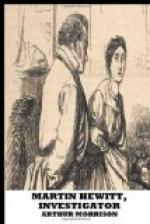“But, if you are right, how did the man get away?”
“Come, we are near home now. Let us take a look at the back of the house. He couldn’t have left by Foggatt’s landing door, as we know; and as he was there (I am certain of that), and as the chimney is out of the question—for there was a good fire in the grate—he must have gone out by the window. Only one window is possible—that with the broken catch—for all the others were fastened inside. Out of that window, then, he went.”
“But how? The window is fifty feet up.”
“Of course it is. But why will you persist in assuming that the only way of escape by a window is downward? See, now, look up there. The window is at the top floor, and it has a very broad sill. Over the window is nothing but the flat face of the gable-end; but to the right, and a foot or two above the level of the top of the window, an iron gutter ends. Observe, it is not of lead composition, but a strong iron gutter, supported, just at its end, by an iron bracket. If a tall man stood on the end of the window-sill, steadying himself by the left hand and leaning to the right, he could just touch the end of this gutter with his right hand. The full stretch, toe to finger, is seven feet three inches. I have measured it. An active gymnast, or a sailor, could catch the gutter with a slight spring, and by it draw himself upon the roof. You will say he would have to be very active, dexterous, and cool. So he would. And that very fact helps us, because it narrows the field of inquiry. We know the sort of man to look for. Because, being certain (as I am) that the man was in the room, I know that he left in the way I am telling you. He must have left in some way, and, all the other ways being impossible, this alone remains, difficult as the feat may seem. The fact of his shutting the window behind him further proves his coolness and address at so great a height from the ground.”
All this was very plain, but the main point was still dark.
“You say you know that another man was in the room,” I said; “how do you know that?”
“As I said, by an obvious inference. Come, now, you shall guess how I arrived at that inference. You often speak of your interest in my work, and the attention with which you follow it. This shall be a simple exercise for you. You saw everything in the room as plainly as I myself. Bring the scene back to your memory, and think over the various small objects littering about, and how they would affect the case. Quick observation is the first essential for my work. Did you see a newspaper, for instance?”
“Yes. There was an evening paper on the floor, but I didn’t examine it.”
“Anything else?”
“On the table there was a whisky decanter, taken from the tantalus-stand on the sideboard, and one glass. That, by the by,” I added, “looked as though only one person were present.”




